Non-alcoholic wine (often called dealcoholized wine or alcohol-free wine) is wine that has had most or all of its alcohol removed after fermentation.
The goal is to retain as much as possible of the flavor, aroma, mouthfeel and complexity of wine, while reducing or eliminating the intoxicating effects.
- In many cases the alcohol is reduced to below 0.5% ABV (or even to 0.0%) depending on local regulations.
- Because alcohol contributes to things like body, aroma release, mouthfeel and preservation, removing it changes the product. Winemakers often use specialized techniques for removing alcohol so as to preserve as much character as possible.
How It’s Made
There are a few common techniques for producing non-alcoholic wine:
- Dealcoholization after fermentation
The wine is normally fermented, then the alcohol is removed (or reduced) via methods like vacuum distillation, reverse osmosis, spinning cone, etc. This tends to better preserve flavor nuances. - Limiting fermentation
Fermentation is stopped early so alcohol doesn’t accumulate to high levels. This is trickier to manage because residual sugars, flavor, acidity, off-flavors can be more difficult to balance. - Blending & finishing techniques
Sometimes non-alcoholic wine will be blended or finished with other processes (oak aging, grape selection, etc) to mimic more closely the tannins, complexity, texture of regular wine.
Market Size and Growth Trends
The non-alcoholic wine market has grown rapidly in recent years as more consumers look for healthier and alcohol-free alternatives.
Wellness trends, mindful drinking, and broader availability in retail have all fueled demand. While the market remains small compared to traditional wine, its momentum suggests strong growth ahead.
Market Size and Recent Figures
In 2023, the global non-alcoholic wine market was valued at USD $2.26 billion, with the United States alone contributing around USD $1.01 billion of that total.
Growth Rates and Forecasts
Looking forward, analysts project steady expansion:
- 7.9% CAGR (2024–2030), with the market expected to reach USD $3.78 billion by 2030.
- 10.4% CAGR (2025–2035), with revenue potentially rising to USD $7.64 billion by 2035.
- 11.6% CAGR (2025–2032), with estimates of around USD $2.61 billion by 2032 from a smaller base.
Historical Growth and Market Share
The past few years have shown remarkable momentum.
Sales of non-alcoholic wine grew more than 88% compared to 2021, highlighting its growing popularity.
Yet despite this surge, it still represents only 0.35% of overall wine consumption, showing how much room remains for expansion.
Non-Alcoholic Wine Brands
Saint Viviana
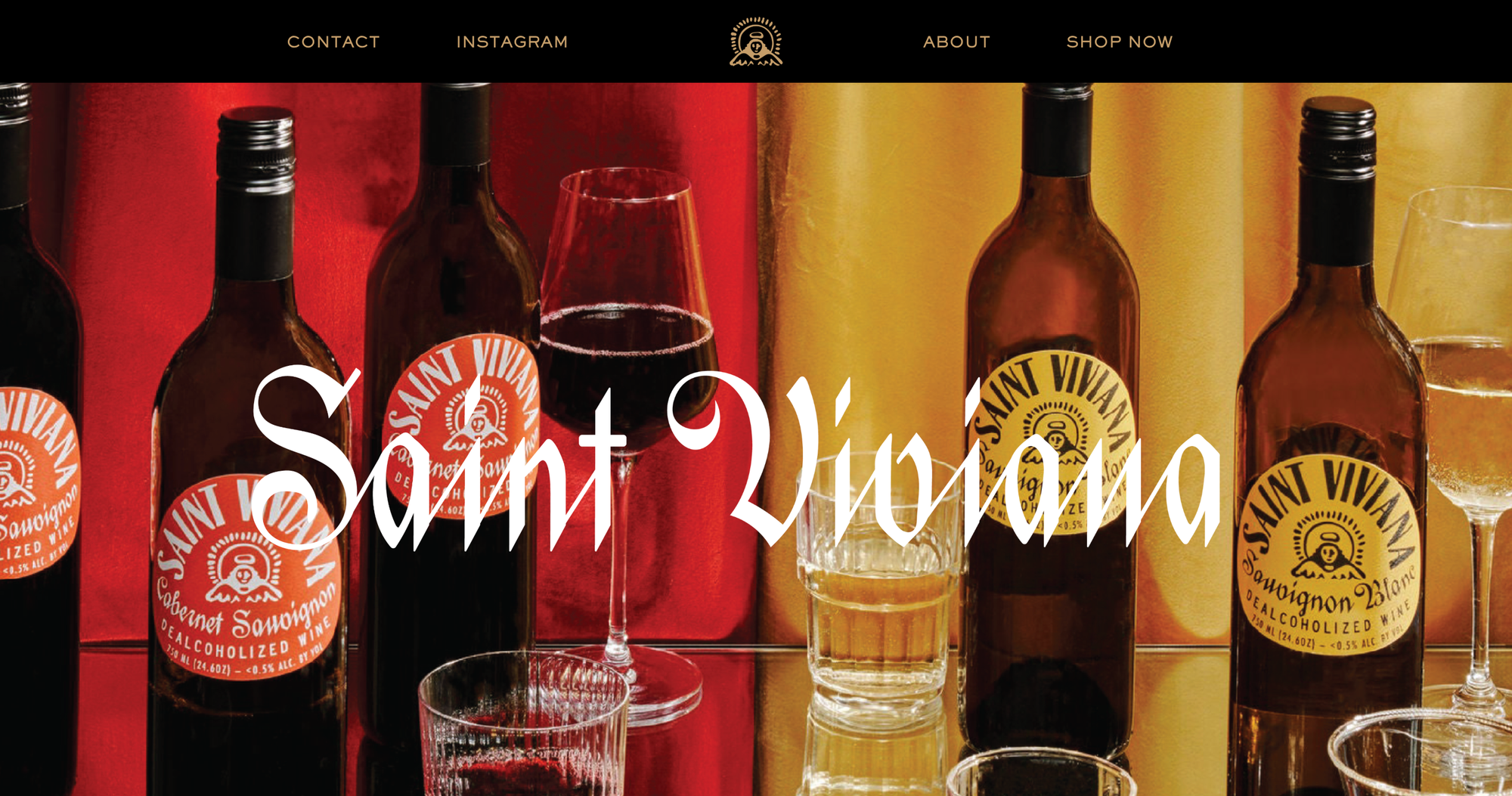
Saint Viviana was founded on the belief that enjoying a glass of wine should be about connection, celebration, and taste rather than alcohol content.
The brand’s collection of non-alcoholic wines is carefully crafted to deliver the flavor, aroma, and sophistication of traditional wines while remaining completely alcohol-free.
Each bottle is produced with attention to the natural character of the grapes, offering crisp whites, balanced reds, and refreshing sparkling options that can be enjoyed at any moment.
From milestone celebrations to casual gatherings or quiet evenings at home, Saint Viviana provides a way to raise a glass without compromise.
As part of the mindful drinking movement, Saint Viviana is committed to offering wine lovers a healthier and more inclusive option, without sacrificing quality or experience.
Leitz (Eins Zwei Zero)
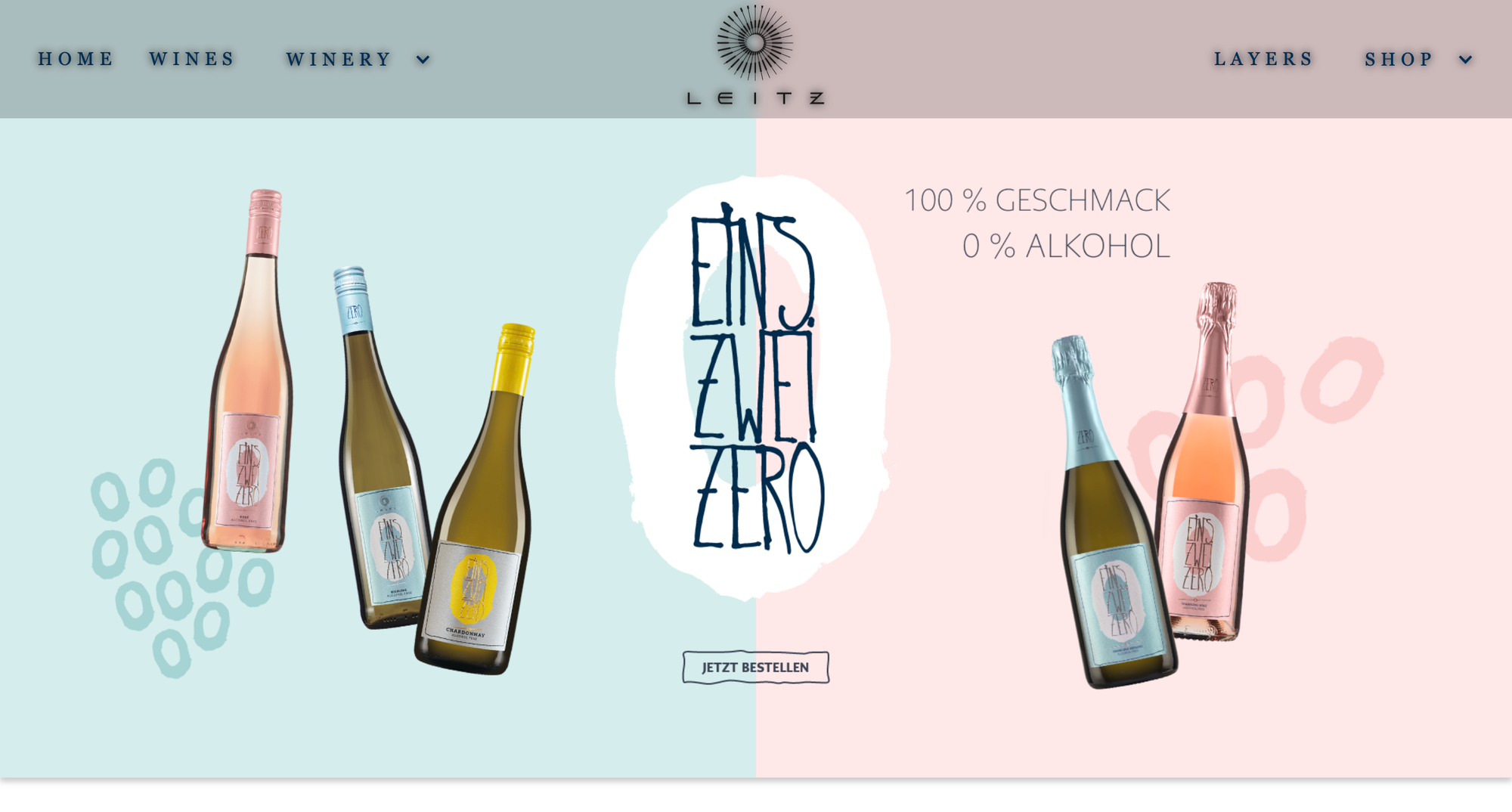
Leitz Winery created the EINS-ZWEI-ZERO collection to redefine what alcohol-free wine can be. Guided by a commitment to nutrition, conscious consumption, and uncompromising quality, the brand delivers still and sparkling wines that offer a genuine alternative for those who choose not to drink alcohol.
The production process is built on precision and care. Using a patented vacuum distillation method developed in the early 20th century, Leitz gently removes alcohol from the wine while preserving its natural aromas.
These grapes are cultivated and vinified with the same attention to detail as Leitz’s estate wines, ensuring that EINS-ZWEI-ZERO delivers authentic character in every glass.
The name EINS-ZWEI-ZERO traces back to Leitz’s popular EINS-ZWEI-DRY Riesling. Inspired by that success, the winery introduced a “zero” version to give wine lovers an inclusive, alcohol-free option that upholds the same dedication to craft and taste.
Giesen
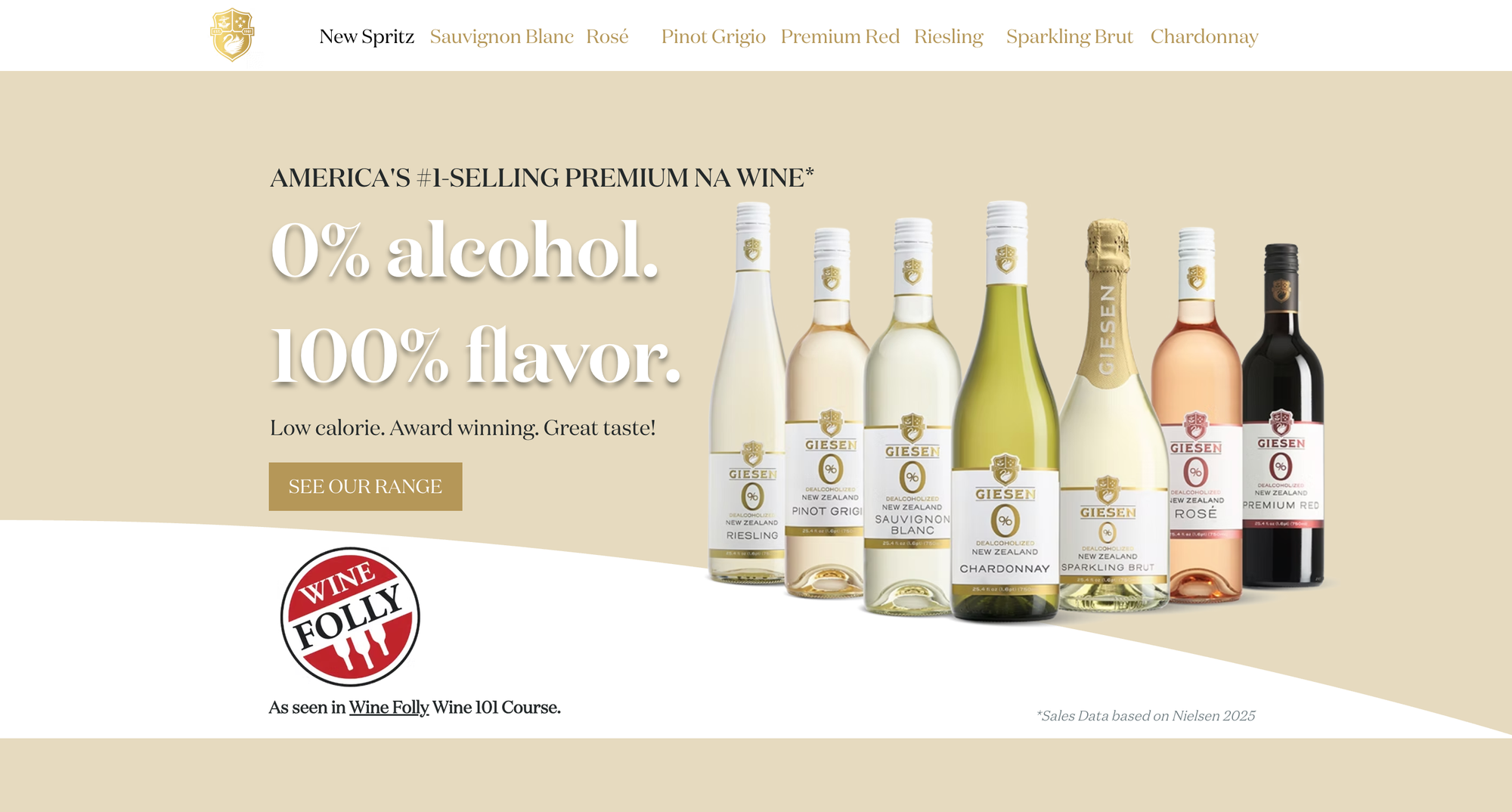
Giesen Wines, one of New Zealand’s most recognized family-owned wineries, has become a leader in the non-alcoholic category with its award-winning Giesen 0% range.
Known as America’s #1-selling premium alcohol-removed wine, Giesen 0% delivers full flavor with none of the alcohol, making it a favorite for mindful drinkers who value both taste and wellness.
Crafted in Marlborough, New Zealand, the wines are produced using advanced dealcoholization techniques that preserve the character and complexity of traditional wine.
From Sauvignon Blanc and Rosé to Riesling, Pinot Grigio, Chardonnay, Sparkling Brut, and Premium Red, the portfolio offers a wide variety of options for every palate and occasion. Each bottle is low in calories, ensuring an inclusive and conscious choice without compromising quality.
Giesen’s non-alcoholic wines have earned global recognition, winning multiple gold medals and high scores at international competitions such as the IWSC and the World Alcohol-Free Awards. Media outlets including The Washington Post, Forbes, and USA Today have praised the range for its authentic mouthfeel and premium taste.
Noughty
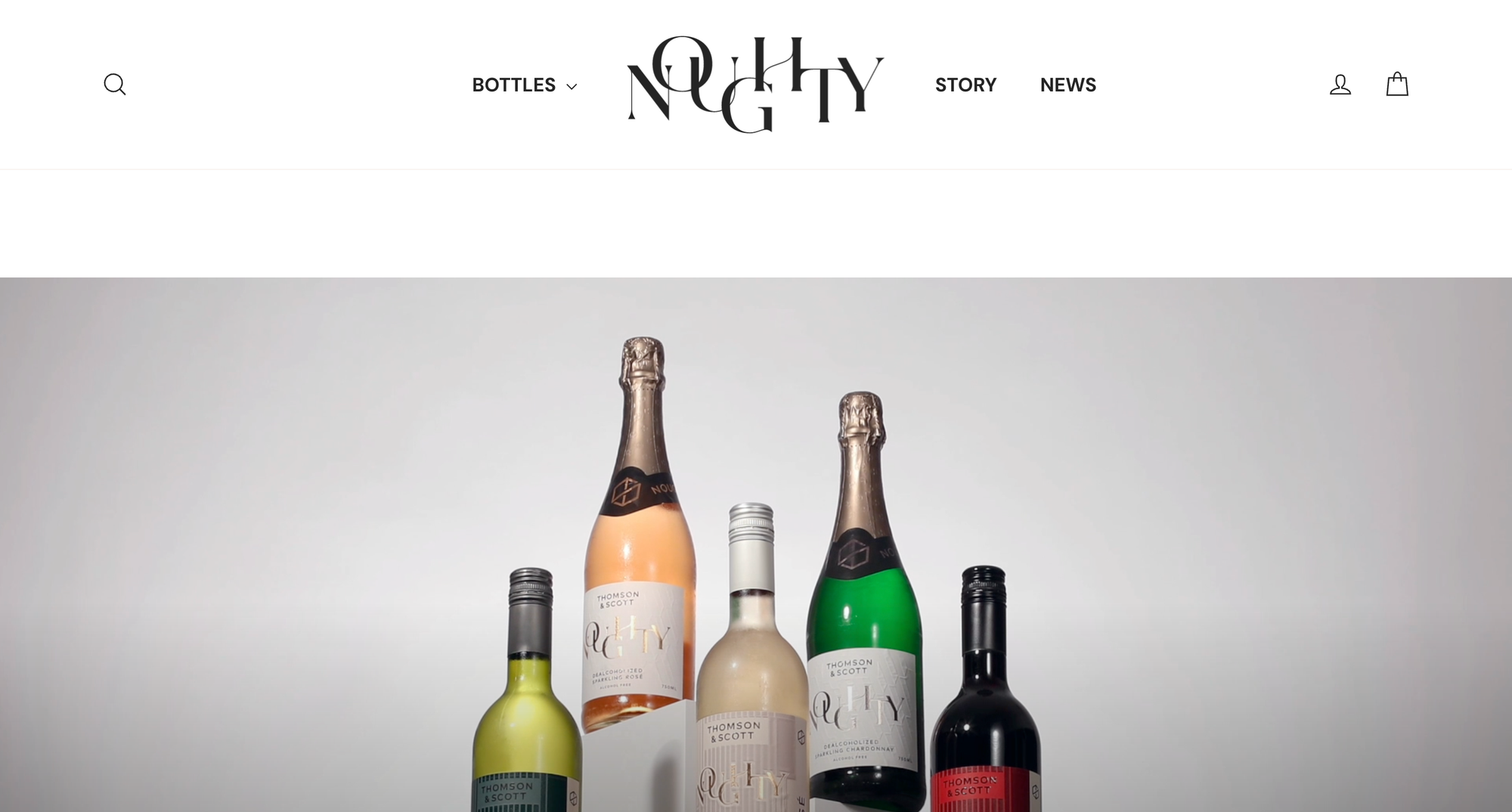
Noughty was created for wine lovers who want to enjoy the taste and elegance of wine while balancing their alcohol intake. Founded by Amanda Thomson, CEO of Thomson & Scott, the brand has become a pioneer in the premium non-alcoholic wine category, offering a sophisticated alternative that doesn’t compromise on flavor or experience.
The Noughty collection features sparkling Chardonnay, sparkling Rosé, Rouge, Blanc, and still Rosé — each carefully crafted to mirror the quality and style of traditional wines while remaining completely alcohol-free.
Produced with a focus on taste, health, and sustainability, every bottle is vegan, organic, and low in sugar, making it a conscious choice for today’s mindful drinkers.
Oddbird
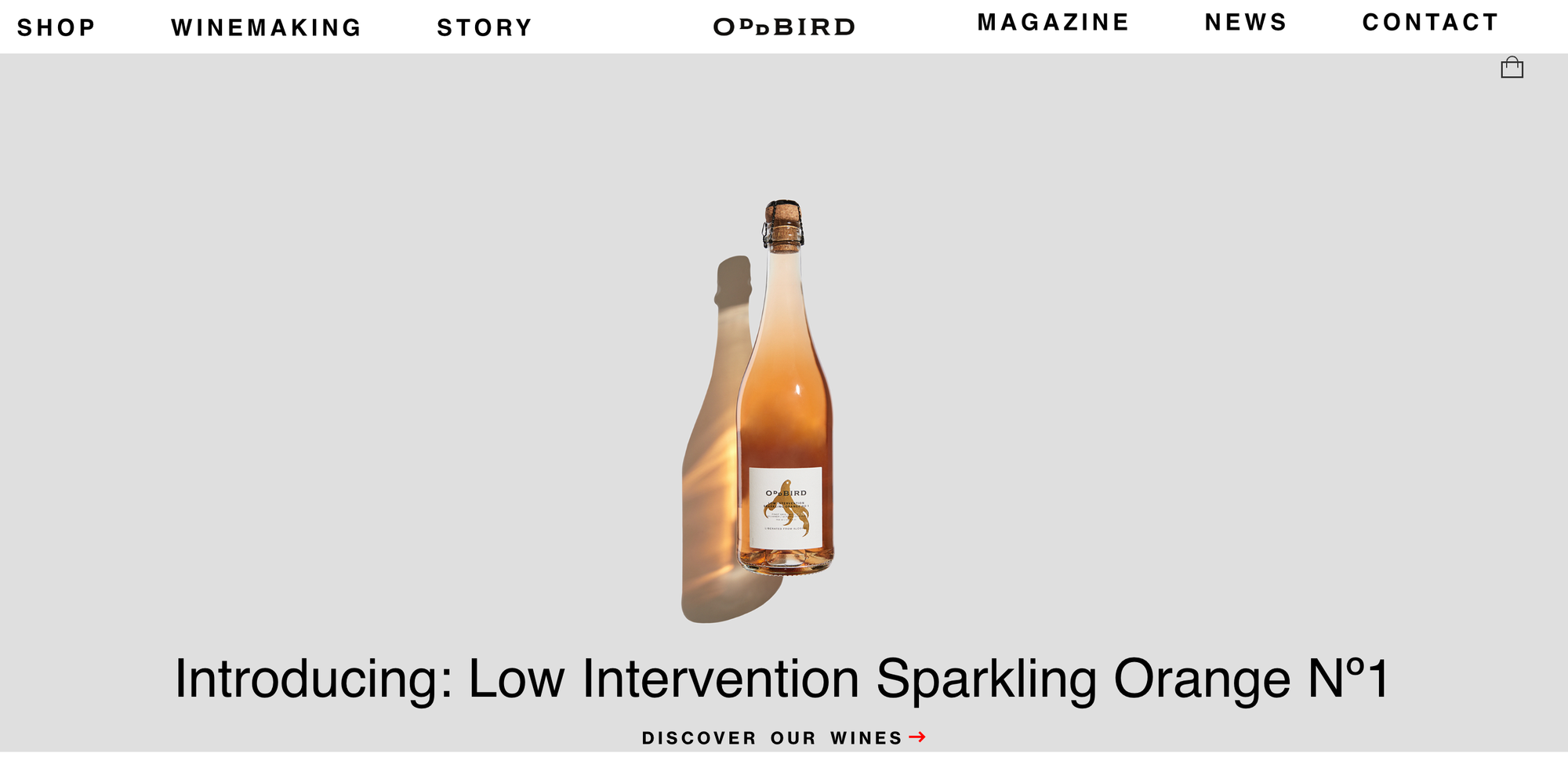
Oddbird was founded with a mission to challenge conventions in both winemaking and drinking culture. The brand creates world-class wines that are crafted with traditional methods, matured for up to 12 months, and then gently liberated from alcohol to preserve the authentic flavors nature intended.
What makes Oddbird unique is not only its innovative production process but also its philosophy. To be “liberated” from alcohol means more than removing the substance, it reflects freedom from cultural expectations around drinking.
Oddbird aims to transform the dinner table into a place where everyone can share in the ritual of wine, without compromise or exclusion.
Each bottle is shaped by tradition and guided by innovation. Grapes are carefully selected from some of the finest vineyards and regions, producing wines that capture the richness of terroir while offering a modern, alcohol-free experience. From sparkling selections to bold reds like the GSM blend, Oddbird continues to redefine what non-alcoholic wine can be.
Zeronimo
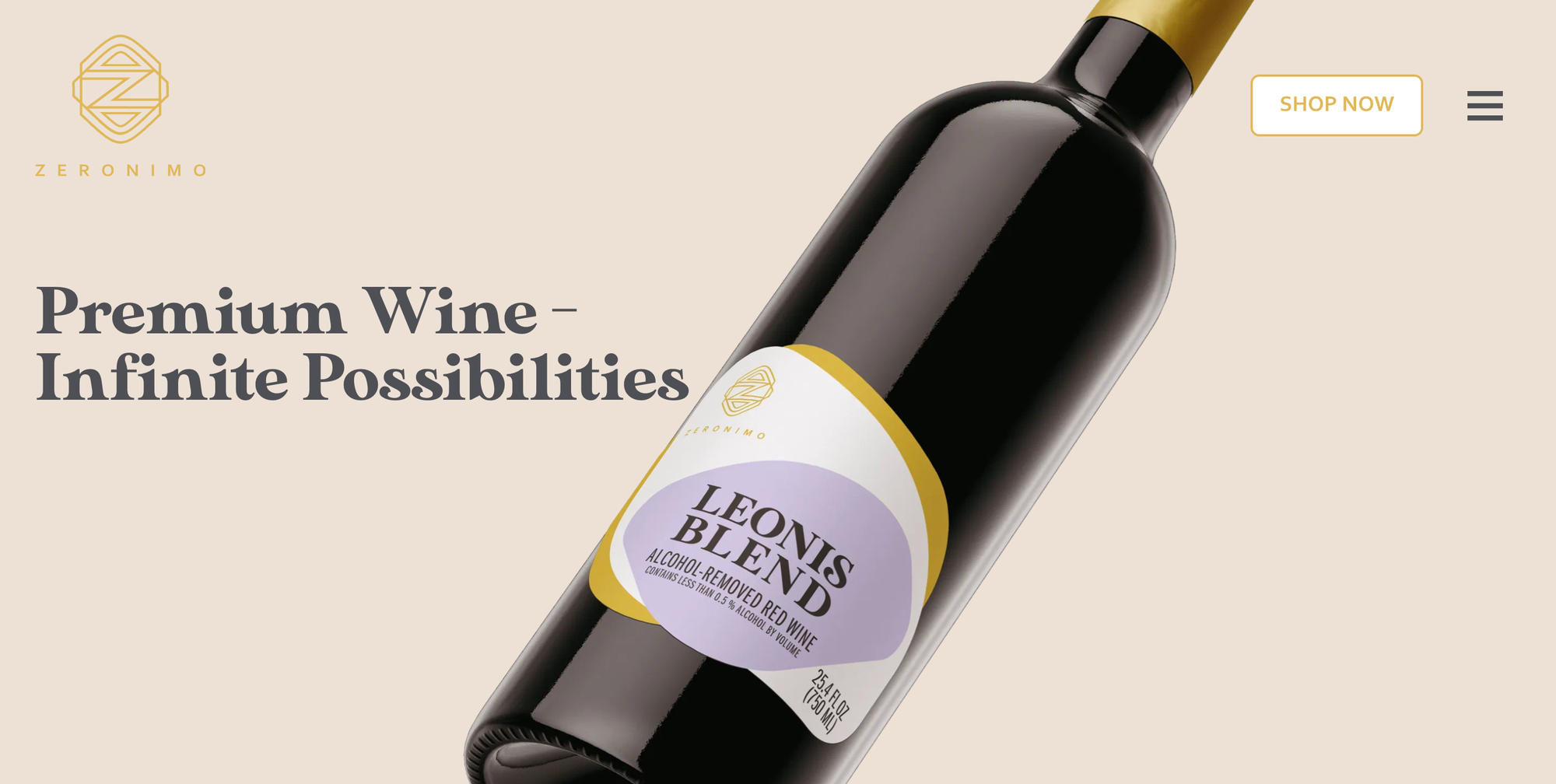
Zeronimo was born from a bold vision: to prove that non-alcoholic wine can achieve the same depth, complexity, and elegance as the world’s finest vintages.
Founded by Austrian winemakers Katja and Patrick of the acclaimed Heribert Bayer family estate, the brand was inspired during Katja’s pregnancy when the couple realized there were no alcohol-free wines that met the standards of true wine lovers.
Determined to change this, they began experimenting with dealcoholization, starting with their award-winning In Signo Leonis, a red wine rated 98 points by Falstaff.
The result was historic. Zeronimo became the first to successfully dealcoholize a 98-point wine, setting a new standard for the industry.
Today, the portfolio includes groundbreaking releases such as the Leonis Blend, celebrated by Wine Enthusiast as “Best Non-Alcoholic Red Wine,” and the Century Blend, a limited-edition 20-year aged red crafted from Blaufränkisch, Pinot Noir, and Merlot.
Proxies
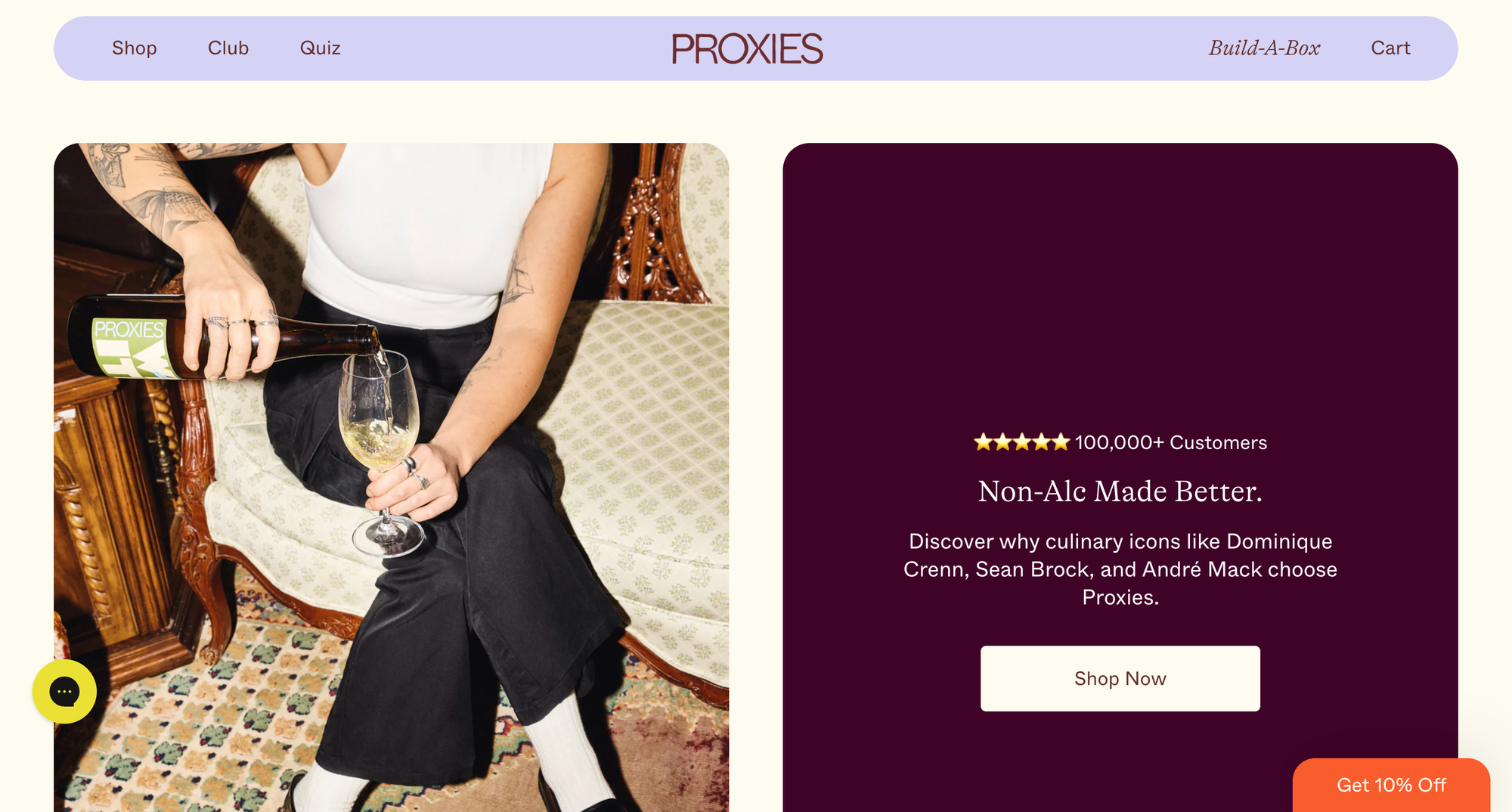
Proxies was created to reimagine what non-alcoholic drinking could be. Unlike traditional dealcoholized wines, Proxies are layered blends of fruit, teas, spices, and bitters, designed to deliver the complexity, body, and acidity of fine wine—without the alcohol.
Crafted for pairing with food and served in your best glassware, Proxies are a modern alternative for those who want the ritual of wine without compromise.
The brand has quickly earned recognition from leading chefs and sommeliers, with culinary icons like Dominique Crenn, Sean Brock, and André Mack embracing Proxies as part of their dining experiences.
Since its launch, Proxies has sold over half a million bottles and built a devoted community of customers who value flavor, creativity, and inclusion.
Fre
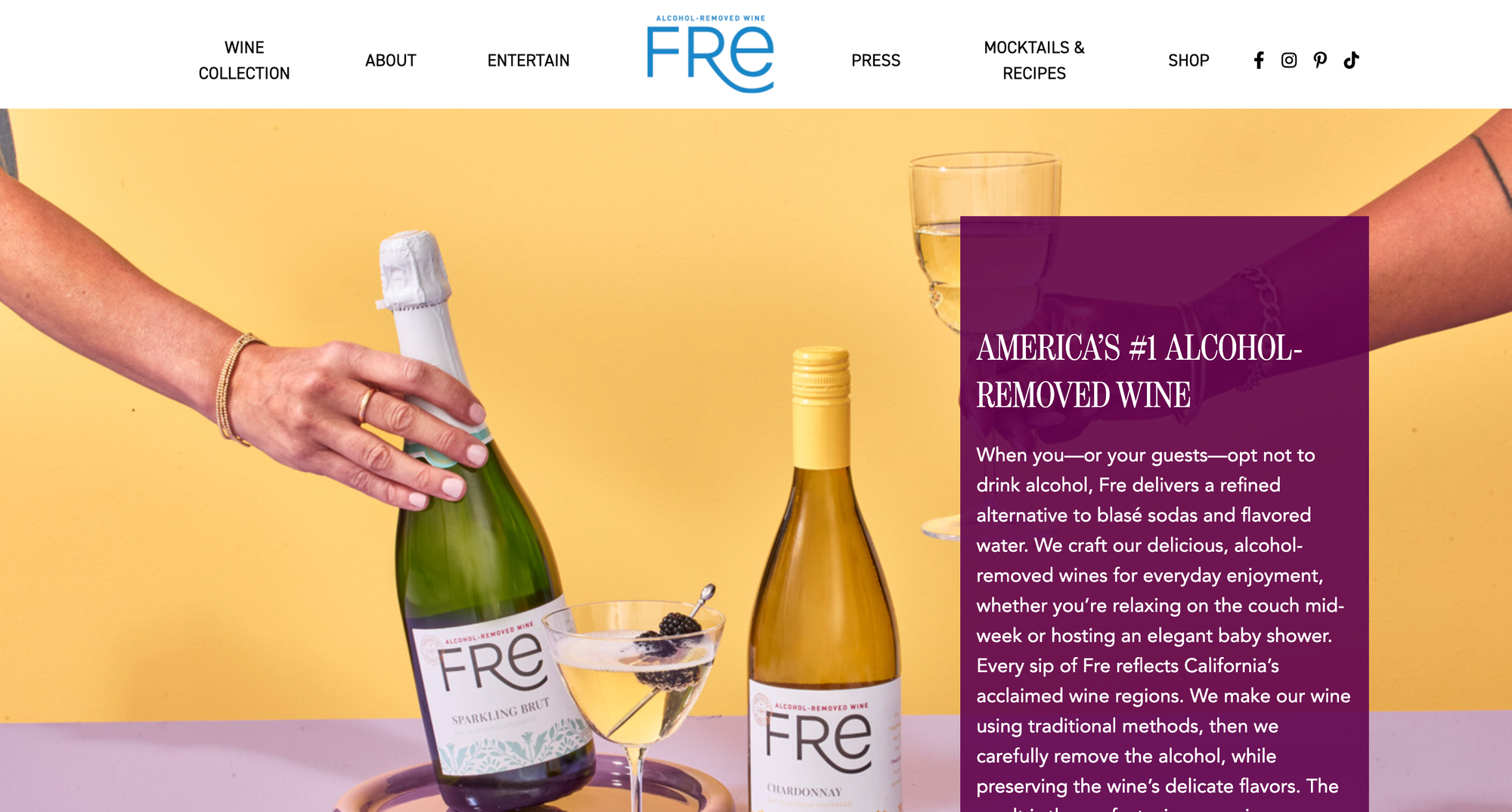
Fre is an alcohol-removed wine, offering a sophisticated alternative for those who choose not to drink alcohol. Whether enjoyed on a quiet evening at home or served at celebrations like baby showers and weddings, Fre provides an inclusive wine experience without compromise.
Each bottle is crafted with the same care as traditional wines, then carefully dealcoholized to preserve delicate aromas, varietal character, and the true essence of California wine.
Rooted in the vineyards of California’s most celebrated regions, Fre draws from the cool, coastal sites of Monterey County and the Mediterranean-like climate of Napa Valley.
The wines are produced in the heart of Napa, where Fre shares a home with its sister winery, Sutter Home Family Vineyards, one of the most historic names in American wine. Visitors can taste Fre’s collection at Sutter Home’s iconic tasting room along Highway 29 in St. Helena, surrounded by rolling hills and picturesque gardens.
Trends, Challenges & Future Outlook
- Taste improvement is ongoing. Some earlier NA wines had off-flavors, medicinal or “cooked” fruit notes. Newer methods and better grape selection are yielding much closer approximations of regular wine.
- Regulation & labeling varies by country. What “non-alcoholic,” “alcohol-removed,” “dealcoholized,” or “0.0%” means in terms of actual ABV can differ.
- Consumer demand rising as more people explore sober living, reduced alcohol consumption, health and wellness, etc. That tends to push producers to invest more in quality and variety.
- Price vs affordability remains a challenge. High-quality NA wine often costs more, due to extra processing and smaller production volumes. But as demand grows, scale may bring down costs.








